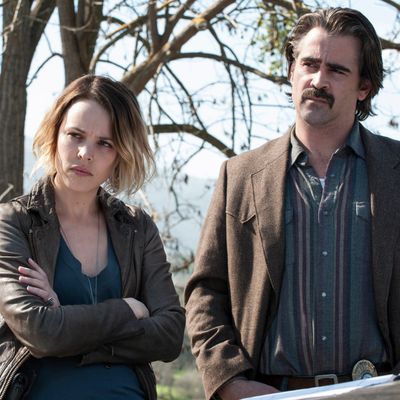
After a season in which it sometimes seemed that True Detective was more interested in exploring the psychological misery of receiving fellatio than exploring the mystery that brought our collection of glowering sad-sacks together, Sunday night’s penultimate episode saw a welcome shift of tone and pace. Thanks to some true detecting by the soon-to-be-departed Paul Woodrugh, season two’s tangled conspiracy of corrupt cops, black-tie sex parties, and poisonous land-grabs has finally come into focus. Or make that “conspiracies” — to sum it all up briefly, our heroes are dealing with two separate schemes. There’s the Osip-Blake-Tony Chessani-Catalyst orgy gang, who, it turns out, have been plotting against Frank from the very beginning; then there are the leaders of the Vinci Police Department, who were apparently behind a diamond-robbery double-murder in the early ’90s. The main connection between the two groups appears to be Ben Caspere, who was holding on to blackmail bait from the sex parties, as well as the pilfered diamonds from the decades-old heist. Which brings us to the question that kicked off this season: Who killed Caspere?
Both criminal conspiracies appear to be off the hook. Blake swears the Catalyst group was as shocked by Caspere’s murder as Frank was, and Teague Dixon’s search for the missing diamonds implies that the Vinci police weren’t behind it, either. Who does that leave? The sleuths at Reddit’s True Detective subreddit, who have spent this season largely deprived of the opportunity to draw up their own convoluted theories obsessively, have sped into action and come to a vague consensus on whodunnit. Let’s see what they’ve been speculating!
To start, we need to go back to that 1992 robbery, the one that left two small children orphaned, and Caspere in possession of those rare blue diamonds. It takes longer to Google the correct spelling of Chekhov than it does to understand that those kids were going to pop up again later, and in Sunday night’s episode, our team put some of the pieces together: The daughter was actually Caspere’s secretary, working for him under an assumed name! Could she have murdered Caspere in revenge? Probably! Why else would she work for the guy who helped kill her parents?
But what about her brother, whose identity has so far gone undiscovered? From there it helps to remember the last time we saw the secretary: She showed up, slightly randomly, on the film set in episode three. She swore she was only there to get some files about the tax-incentive deal that Caspere hammered out — but what if she was really there for murder business? Say, to check in with the film’s set photographer … who was secretly her brother and accomplice? (This is where you gasp into your screen.)
The evidence is circumstantial, but it’s there. The set photographer seemed to whisper something to the secretary when they crossed paths. He knew about the sex parties — which the secretary also attended, for as-yet-unknown reasons — and, in retrospect, was very interested in pointing Ray in that direction. He could have had access to the stolen film car that dropped Caspere’s body off at the crime scene, and he likely knew the address of the old production assistant, which the killer would have needed in order to torch the car outside just as Ray and Ani arrived to question him. And, as one redditor figured a month ago, the photographer being Caspere’s murderer would match the precedent set in season one, and in thousands of episodes of Law & Order: Just like the Spaghetti Monster, the set photographer was a minor character who popped up early in the season and had a friendly, unmemorable encounter with one of the leads.
And do you remember why was it so unmemorable? Partly because of the context: Ray’s meeting with the photographer happened immediately before one of the most-talked-about scenes of True Detective’s second season: the interview with the obnoxious director who seemed so clearly patterned on Cary Fukunaga. Did Pizzolatto intentionally throw in a reference to his alleged feud with Fukunaga as misdirection, knowing that the gutter press would be unable to focus on anything except the gossip? If that’s the case, then, well, he deserves to be called the truest detective of them all.


